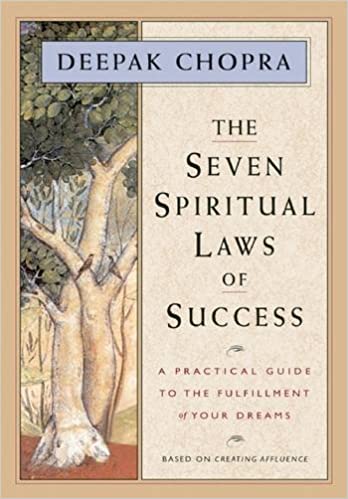The Seven Spiritual Laws of Success by Deepak Chopra
The Book in 1 Sentences
The Seven Spiritual Laws of Success: A Practical Guide to the Fulfillment of Your Dreams
“Success in life could be defined as the continued expansion of happiness and the progressive realization of worthy goals. Success is the ability to fulfill your desires with effortless ease.
And yet success, including the creation of wealth, has always been considered to be a process that requires hard work, and it is often considered to be at the expense of others. We need a more spiritual approach to success and affluence, which is the abundant flow of all good things to you.
With the knowledge and practice of spiritual law, we put ourselves in harmony with nature and create with carefreeness, joy, and love.” ~ Deepak Chopra
7 BIG Ideas
The Seven Spiritual Laws of Success Book Summary
1. The Law of Pure Potentiality
“When you discover your essential nature and know who you really are, in that knowing itself
is the ability to fulfill any dream you have… and the more you experience your true nature, the closer you are to the field of pure potentiality.”
“When you experience the power of the Self, there is an absence of fear, there is no compulsion to control, and no struggle for approval or external power… Your true Self, which is your spirit, your soul, is completely free of those things. It is immune to criticism, it is unfearful of any challenge, and it feels beneath no one.”
“But first, you have to practice stillness. Stillness is the first requirement of manifesting your desires, because in stillness lies your connection to the field of pure potentiality that can orchestrate an infinity of details for you.”
“Stillness alone is the potentiality for creativity; movement alone is creativity restricted to a certain aspect of its expression. But the combination of movement and stillness enables you
to unleash your creativity in all directions—wherever the power of your attention takes you.”
2. The Law of Giving
“Practicing the Law of Giving is actually very simple; if you want joy, give joy to others; if you want love, learn to give love; if you want attention and appreciation, learn to give attention and appreciation; if you want material affluence, help others to become materially affluent. In fact, the easiest way to get what you want is to help others get what they want.”
Eric Butterworth - in his book Spiritual Economics- also says “In an orderly Universe, there is simply no way you can get something for nothing.”
And “The takers are the people who believe that their lives will always be the total of what they can get from the world. They are always thinking get, get, get. They plan and scheme ways to get what they want in money, in love, in happiness, and in all kinds of good. No matter that they may be applying metaphysical techniques, they still may very well be takers. But whatever may be their spiritual ideals or lack of any, no matter what they take, they can never know peace or security or fulfillment…
The givers, on the other hand, are convinced life is a giving process. Thus their subtle motivation in all their ways is to give themselves away, in love, in service, and in all the many helpful ways they can invest themselves. They are always secure, for they intuitively know that their good flows from within.”
3. The Law of Karma
“The best way to understand and maximize the use of karmic law is to become consciously aware of the choices we make in every moment.”
Swami Vivekananda also says “Karma is the eternal assertion of human freedom… Our thoughts, our words, and deeds are the threads of the net which we throw around ourselves.”
4. The Law of Least Effort
“Grass doesn’t try to grow, it just grows. Fish don’t try to swim, they just swim. Flowers don’t try to bloom, they bloom. Birds don’t try to fly, they fly. This is their intrinsic nature.”
The “Law of Least Effort” is based on three components: acceptance, responsibility and defenselessness.
“This means that your acceptance of this moment is total and complete. You accept things as they are, not as you wish they were in this moment. This is important to understand. You can wish for things in the future to be different, but in this moment you have to accept things as they are.”
“All problems contain the seeds of opportunity, and this awareness allows you to take the moment and transform it to a better situation or thing.”
“When you remain open to all points of view—not rigidly attached to only one—your dreams and desires will flow with nature’s desires… you can be sure when the season is right, your desires will manifest.”
5. The Law of Intention
“One-pointed intention is that quality of attention that is unbending in its fixity of purpose. One-pointed intention means holding your attention to the intended outcome with such unbending purpose that you absolutely refuse to allow obstacles to consume and dissipate the focused quality of your attention.
There is a total and complete exclusion of all obstacles from your consciousness. You are able to maintain an unshakable serenity while being committed to your goal with intense passion. This is the power of detached awareness and one-pointed, focused intention simultaneously.”
“Learn to harness the power of intention, and you can create anything you desire.”
6. The Law of Detachment
“The Law of Detachment says that in order to acquire anything in the physical universe, you have to relinquish your attachment to it. This doesn’t mean that you give up the intention to create your desire. You don’t give up the intention, and you don’t give up the desire. You give up your attachment to the result.”
“The moment you relinquish your attachment to the result, combining one- pointed intention with detachment at the same time, you will have that which you desire.”
7. The Law of Dharma
“Everyone has a purpose in life… a unique gift or special talent to give to others. And when we blend this unique talent with service to others, we experience the ecstasy and exultation of our own spirit, which is the ultimate goal of goals.”
“You have a talent that is unique in its expression, so unique that there’s no one else alive on this planet that has that talent, or that expression of that talent. This means that there’s one thing you can do, and one way of doing it, that is better than anyone else on this entire planet.”
Buddha - in The Dhammapada- says: “Your work is to discover your work, and then with all your heart, to give yourself to it.”
Marcus Aurelius - in Meditations - says: “Everything—a horse, a vine—is created for some duty… For what task, then, were you yourself created? A man’s true delight is to do the things he was made for.”
Abraham Maslow says: “Musicians must make music, artists must paint, poets must write if they are to be ultimately at peace with themselves. What human beings can be, they must be. They must be true to their own nature. This need we may call self-actualization.”
Russell Simmons - in Do You!- says: “Your purpose is to act on the resources God gives you. If God gives you a bucket of fish, you have to distribute those fish. If you don’t, they’re going to rot, attract a bunch of flies, and start stinking up your soul.”
And always remember that “When you combine the ability to express your unique talent with service to humanity, then you make full use of The Law of Dharma.”
That was my QUICK summary of the great book The Seven Spiritual Laws of Success by Deepak Chopra. If you’re interested, get your copy. There is a HUGE amount of life-changing ideas in this book, and we’ve only touched on a tiny bit of it.
Buy The Book: The Seven Spiritual Laws of Success by Deepak Chopra

GET Blinkist 7 Days FREE Trial
3000+ Book Summaries
(Audio and Text)








